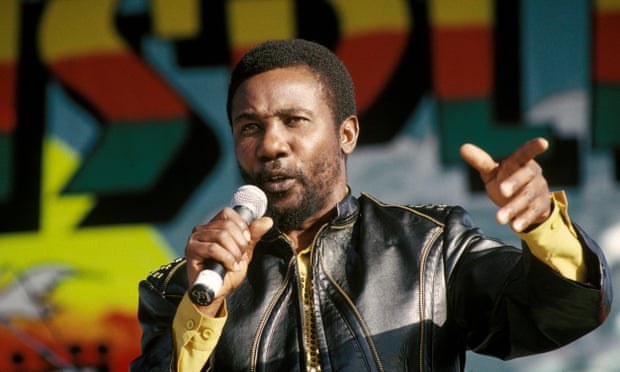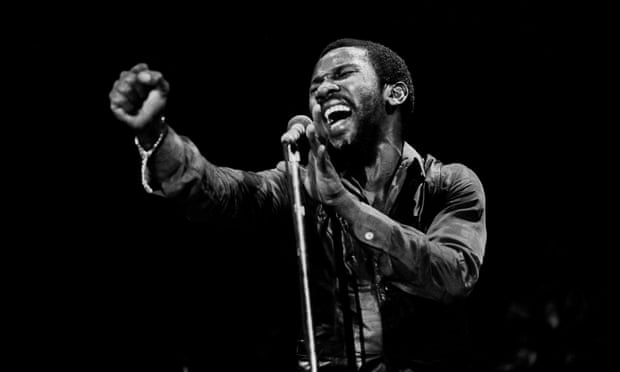Singer and songwriter with Toots and the Maytals who took reggae to global audiences.
In the years before Bob Marley shot to worldwide fame, Toots Hibbert, who has died aged 77, was one of the main global faces of reggae music – or at least of its predecessors, ska and rock steady.
As singer and songwriter with the Maytals, later to become Toots and the Maytals, Hibbert was responsible for a number of Jamaican classics that were not only hits in their own right but were given vibrant second lives by admiring artists in Britain and elsewhere.
Among those songs was Pressure Drop, a 1969 composition about the daily strains of ghetto life in Jamaica that came to worldwide attention when it appeared in the 1972 film The Harder They Come and was also given a popular run-through by the Clash. Hibbert’s other big tune of that year, Monkey Man, in which he expressed the jealous thoughts of a spurned lover, became a UK hit and was later covered by the Specials and Amy Winehouse, while 54-46 Was My Number – written after Hibbert had experienced a spell in jail during the mid 1960s – became a defining rock steady/reggae tune when it appeared in 1968. It was also later revived – by Aswad in 1984.
Other Hibbert songs such as Never You Change, Bam Bam, Fever, Sweet and Dandy and Funky Kingston also stand high in the Jamaican canon, and he had the further distinction of having been the first artist to have used the word reggae in a song title, albeit spelt in now-unfamiliar fashion, with his 1968 composition Do the Reggay.
Hibbert was born into a large household in the town of May Pen in Jamaica and was given the nickname Little Toots by an older brother. Both of his parents had died by the time he was 16 and after he had married his childhood sweetheart, Doreen, at the age of 18, he moved in the early 1960s to the Trenchtown area of Kingston, landing a job in a barber shop and, in 1962, putting together a vocal harmony trio with two new Kingston friends, Jerry Matthias and Raleigh Gordon.
First called the Vikings and then the Maytals in part tribute to Hibbert’s home town, the three eventually became seven with the addition of the instrumentalists Jackie Jackson, Paul Douglas, Hux Brown and Radcliffe Bryan, although the lineup changed over the years.

As the ska beat took hold in Jamaica, the Maytals rode the wave with a succession of local hit singles, many of them for the producers Prince Buster and Clement Dodd. There were also two studio albums in those early days – Never Grow Old (1964) and The Sensational Maytals (1965).
In 1966 the band hit a new high by winning the first Jamaican Independence festival Popular Song Competition, with the Hibbert composition Bam Bam. Shortly afterwards, however, he was arrested on his way home from a concert in Ocho Rios and was subsequently jailed for possession of cannabis, a charge he always maintained was trumped up, not least because he did not even smoke marijuana at the time.
When he was released from prison a year later (by which time, ironically, he had become a convert to cannabis), Hibbert gamely took up where he had left off, using his prison number, 54-46, as the basis for perhaps his most enduring hit, and then winning the 1969 version of the national song competition with Sweet and Dandy.
In 1970 the Maytals appeared at Wembley for a successful first major reggae festival in the UK, along with Bob & Marcia, Desmond Dekker and the Pioneers.
In 1972 they came to wider attention in the first Jamaican-produced feature film – The Harder They Come – starring Jimmy Cliff as Ivan, a young man who has moved to Kingston to seek musical fame. When Ivan first ventures into a recording studio it is the real life Hibbert he sees going through his paces, and it is he that he takes on as his initial role model. Pressure Drop and Sweet and Dandy were included on the 1973 soundtrack album, bringing Hibbert to an even bigger audience.
By that time the band had become Toots and the Maytals, having teamed up with Chris Blackwell of Island Records, who had also persuaded Hibbert to compose the much admired song Funky Kingston, which became the title of their 1972 album.
Under Blackwell’s later direction, Hibbert’s global recognition increased further, and he and his band toured the world, with groups such as the Who and the Eagles.
In 1982, however, Hibbert came to an amicable agreement to disband the Maytals project and the following year released a solo album, Spiritual Healing, which explored the Rastafarian beliefs that he had nurtured for many years.
A period of inactivity followed, but by the late 80s Toots and the Maytals had been revived, mainly as a touring force, although albums were occasionally released, including the Grammy award-winning True Love (2004)
In 2013 at a concert in Richmond, Virginia, in the US, Hibbert was hospitalised after being struck by a bottle hurled from the audience. The ramifications were significant, for, apart from suffering cuts and concussion, he found he could no longer remember the lyrics to his songs, that his songwriting mojo had disappeared, and that he had begun to experience panic attacks. After a three-year hiatus in which all his touring and recording work came to a halt, he did, however, manage to make a recovery.
In August Toots and the Maytals released their first studio album in a decade, Got to Be Tough. Hibbert was due to be touring with that album in the US and UK when he was struck down by respiratory problems.
He is survived by his wife and seven children.
Toots (Frederick Nathaniel) Hibbert, musician, born 8 December 1942; died 11 September 2020.














